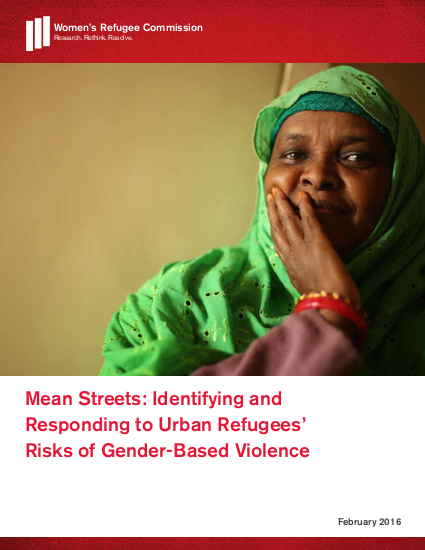
Today, an increasing majority (nearly 60%) of people fleeing conflict and persecution take refuge in cities rather than in refugee camps or settlements. Yet because much of what humanitarian actors know about preventing and responding to gender-based violence (GBV) was learned in camp settings, many of the GBV risks refugees face in urban settings have yet to be documented, let alone addressed in response programming. Mean Streets: Identifying and Responding to Urban Refugees’ Risks of Gender-Based Violence is a comprehensive look at the GBV risks faced by urban refugees, as well as a discussion of opportunities and challenges unique to enhancing refugees’ protection in urban spaces. Its findings and recommendations are based on research conducted by WRC throughout 2014, in Beirut, Lebanon; Quito, Ecuador; Delhi, India; and Kampala, Uganda. Central to the report are the voices of refugees themselves, who were consulted directly in each city. Given the diversity of refugees living in cities, and differences in their GBV risks, the report offers separate discussions of the risks faced by the following refugee populations: women; children and Adolescents; LGBTI Individuals; refugees engaged in sex work; persons with disabilities; and men and boys, including male survivors.
Resource collections
- Accountability to affected populations (AAP)
- Topics
- UN Habitat - Urban Response Collection
- Urban Response - Urban Crisis Preparedness and Risk Reduction
- Urban Response Collection - Community Engagement and Social Cohesion
- Urban Response Collection - Economic Recovery
- Urban Response Collection - Environment and Climate Change
- Urban Response Collection - Housing, Land and Property
- Urban Response Collection - Urban Crisis Response, Recovery and Reconstruction
- Urban Response Collection - Urban Resilience
